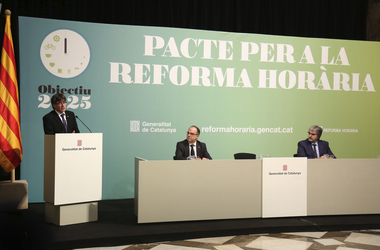- Working Hours Reform PactUnions, representatives and activists sign a pact to make working days in Catalonia shorter, more flexible and more compact
- Minister Turull: “We can bring about a real revolution to fight economic inequalities and encourage healthier habits”

This week, over one hundred unions, companies, educational groups and activists signed the Pact on Working Hours Reform to make working days in Catalonia shorter, more flexible and more compact.
The agreement signed on Monday at the Palau de la Generalitat aims to improve the work-life balance and standardize working hours across different industries by the year 2025. It also means to promote a new culture of time management in favour of a more efficient model to meet new social needs.
The pact also intends to reduce the time allocated for lunch breaks, which ordinarily last between two and three hours resulting in the workday not finishing until 8 p.m. or later. This custom has its origin from when General Francisco Franco changed the clocks forward an hour in solidarity with Hitler’s Germany in 1942. Historically, the Spanish state had shared the same time zone with the UK and Portugal but for the last thirty years, the working day has stretched out to the point of affecting people’s wellbeing.
In the opening remarks of the signing ceremony, the Minister of the Presidency, Jordi Turull, highlighted the importance of synchronizing Catalan schedules to other European countries to make working hours “healthier and more rational in order to increase the time for rest and recreation, while increasing our productivity”.
By changing only two hours of a twenty-four hour day “we can bring about a real revolution to fight economic inequalities and encourage healthier habits”, the Minister assured. “A new culture of time in organizations and companies with more flexible models will lead to more efficiency, increase competitiveness and save energy, among other benefits”, he added.
In this regard, Carles Puigdemont, who presided over the event, said the agreement was necessary in a society that is “at the doors of an industrial revolution”. A revolution, he added, which will “generate deep changes and have a direct impact on time and the way we relate to it”.
According to the President, “every pact begins with the recognition that we have a problem and, in the case of time, our problem lies in how we distribute it”. “We waste time, and we do it in a society that already wastes food, energy, and resources. […] We cannot continue this way”, he affirmed.